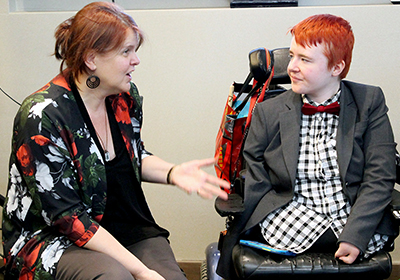Symposium Agenda

Tuesday, March 14
What current models, frameworks or approaches exist and how useful are they?
8:30 – 9:00 am
Registration
9:00 – 9:15 am
Welcome and Introduction
Sheryl Burgstahler (University of Washington, United States) and other members of the Ed-ICR leadership team Jane Seale (ED-ICT network leader, The Open University, UK); Tali Heiman (Open University, Israel); Catherine Fichten (Dawson College, Canada) and Björn Fisseler (FernUniversität, Germany)
9:15 – 10:00 am
Introductory Ice-Breaker Activity
Sheryl will lead a 5-10 minute engagement exercise that sheds light on the experience of disability
Jane will follow up with an activity that encourages people to share in pairs or threes one thing that they do well in relation to support and delivery of ICT for students with disabilities and one thing they would like to do better
10:00 – 11:00 am
Presentation: Setting the Scene
An overview of models in the field and the questions we need to ask of them
By Jane Seale
Paper will be circulated prior to meeting
Title: What models, approaches or frameworks exist in the field of disability, ICT (information and communication technology) and post-secondary education; are they successful in transforming the support and delivery of ICT for disabled students or do we need new ones?
11:30 – 12:45 pm
International Panel
A panel discussion with one person from each participating country: Tali Heiman (Israel); Alice Havel (Canada); Chetz Colwell (UK); Dan Comden (US) and Christian Buehler (Germany)
Title: What typical models, approaches or frameworks are used in each country for supporting and delivering ICT for disabled students in post-secondary education and how successful are they?
12:45 – 1:45 pm
Lunch and Networking
1:45 – 2:45 pm
Presentation
Applying models in practice: an individual perspective
By Sheryl Burgstahler
Title: How design frameworks and models have informed her work
2:45 – 3:45 pm
Round-Table Discussions
Small group discussions focusing on what models, frameworks or approaches they use in their own practice, how they use them and the factors that influence the value and utility of the models, frameworks or approaches
3:45 – 4:30 pm
Plenary
Led by Jane
Overview of discussions
Wednesday, March 15
Do we need new models, frameworks or approaches or just better evidence for our existing models--what are the implications for research?
8:30 – 9:00 am
Registration, Networking
9:00 – 9:30 am
Summary and Reflection
Led by Jane Seale, Leader of the Ed-ICT Network
9:30 – 10:15 am
Participant Panel Discussion: Design Issues
Facilitated by Sheryl
What are the design issues regarding ICT with respect to the institution and students with disabilities in post-secondary education? …and how if at all do models and frameworks contribute to resolving those issues?
10:15 – 11:00 am
Participant Panel Discussion: Transition Issues
Facilitated by Sheryl
What are the ICT issues related to transition to employment for students with disabilities? …and how if at all do models and frameworks contribute to resolving those issues?
Participant Panel: Student Issues 11:30 – 12:30 pm
Facilitated by Sheryl
Students with disabilities will share their experiences of how the support and delivery of ICT has impacted on their learning and transitions between education levels and to employment 11:30-12:30
12:30 – 1:30 pm
Lunch and Networking
13:30 – 3:00 pm
World Café
Led by Jane
At each of the tables Jane will place a flip chart with a question or statement (derived from previous day and half discussions) and ask each group to respond to that by mind-mapping their response to the question on the flip-chart. (pens and post-its provided)
The groups will rotate around the tables- so that they can add their own responses to the original question and respond to other peoples’ responses if they wish. The mind-map expands with each rotation.
Questions will focus on what research is needed to resolve the issues highlighted in relation to models and frameworks; what is needed to move practice forward and how research and practice might inform one another.
3:00 – 3:45 pm
Plenary
Led by Jane
Overview of world café outputs and discussion on where to next regarding research plans for the group.